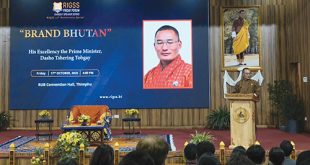Despite repeated warnings and enforcement efforts, both online and traditional gambling continue in Bhutan. Police reports indicate a sharp increase in online scams and gambling activities conducted through platforms like Telegram, WeChat, WhatsApp and Tiktok while card gambling remains widespread across communities.
According to the statistics of Royal Bhutan Police (RBP), gambling and online scam cases have seen a rise.
Card gambling remains the most common offence, recording 15 cases so far in 2025, with a total of 60 cases from 2022 till date. However, newer forms of betting such as online ludo, dice, Shillong teer, and lottery gambling have also emerged, with a total of 16 cases. Online dice gambling has been climbing from one case in 2022 to six cases this year.
The Deputy Chief of Police at the RBP Headquarters, Colonel Passang Dorji, said that even casual games played among friends or family such as online Ludo or card games are considered gambling if they involve money. “Yes, that is also gambling, as long as money is involved and if caught, it will be treated as such,” Colonel Passang Dorji said.
He said that with the rise of social media use, online gambling has become more visible and traceable. He said, “We have our own social media tracking system. Through it, we are able to track many of those involved in online gambling. Recently, we managed to trace and take action against many individuals through this system.”
According to Colonel Passang Dorji, around 40 to 50 individuals were recently arrested for online gambling, and similar arrests, detentions, charge sheets, and convictions have been made over the past year.
“For the first timer, we are trying to help them by advising and warning not to engage in gambling since it is illegal and a crime. But if they repeat the offence, they will be arrested, detained, and charged in court as per the law,” he said.
He also highlighted that gambling often has links with other criminal offences, such as theft, battery, stabbings, and even sexual crimes, warning that individuals must take responsibility to prevent such consequences.
Colonel Passang Dorji said that enforcement against card gambling largely depends on tip-offs and police surveillance, while in online cases, public complaints and reports from concerned citizens have proven very helpful and requested for more such coordination from the public.
However, he admitted that tracking every offender remains a challenge, and he said, “Sometimes, out of 100 individuals involved, we can trace only about 50 percent. The rest continue the games underground. That’s why, even though we keep arresting people, gambling still continues.”
Meanwhile, online scams have increased dramatically particularly in urban centers. The Thimphu division alone registered 115 cases as of 13th October 2025, up from just 22 in 2022, indicating a sharp escalation. Other regions like Paro, Phuentsholing, and Gelephu have also reported multiple cases involving fraudulent investment offers, fake house rent advertisements, and online lotteries etc.
In 2024 and 2025 alone, police recorded 235 online scam cases, involving over Nu 26.8 million (mn), of which only Nu 11.7 mn has been recovered and restituted. The scams most frequently reported include currency exchange frauds, fake investment opportunities, and false lottery wins.
Several cases are also linked to cross-border networks operating from Jaigaon. Jaigaon police recently arrested a youth from Bihar for running an illegal lottery racket targeting Bhutanese residents through WhatsApp and Telegram groups.
While Bitcoin and cryptocurrency-related crimes remain relatively low, with fewer incidents reported in Thimphu, Phuntsholing, Trashiyangtse, Lhuentse and Pemagatshel in 2022 and 2023, police share that online gambling and scams have quickly become the more pressing concern.
Evidence shared by police, including screenshots and video clips from Telegram and Tiktok, reveal Bhutanese users actively participating in online betting, particularly through illegal lottery and dice games.
He shared that most of those involved in scams fall within the 18 to 30 age group, though cases also include individuals aged up to 45.
The Deputy Chief of Police said that most online scams are operated by non-Bhutanese individuals based outside the country, often using Bhutanese middlemen to target local victims. “For just a small share of easy money, our people are risking their freedom, while the real profit goes to the masterminds abroad.” he pointed out.
“Everyone is looking for easy and fast money, and that’s why more people are getting drawn into these scams,” he added.
He emphasized that addressing such crimes is a shared responsibility between law enforcement agencies and the public.
Since 2022, the RBP has been carrying out awareness programs to educate the public about emerging online crimes.
 The Bhutanese Leading the way.
The Bhutanese Leading the way.




